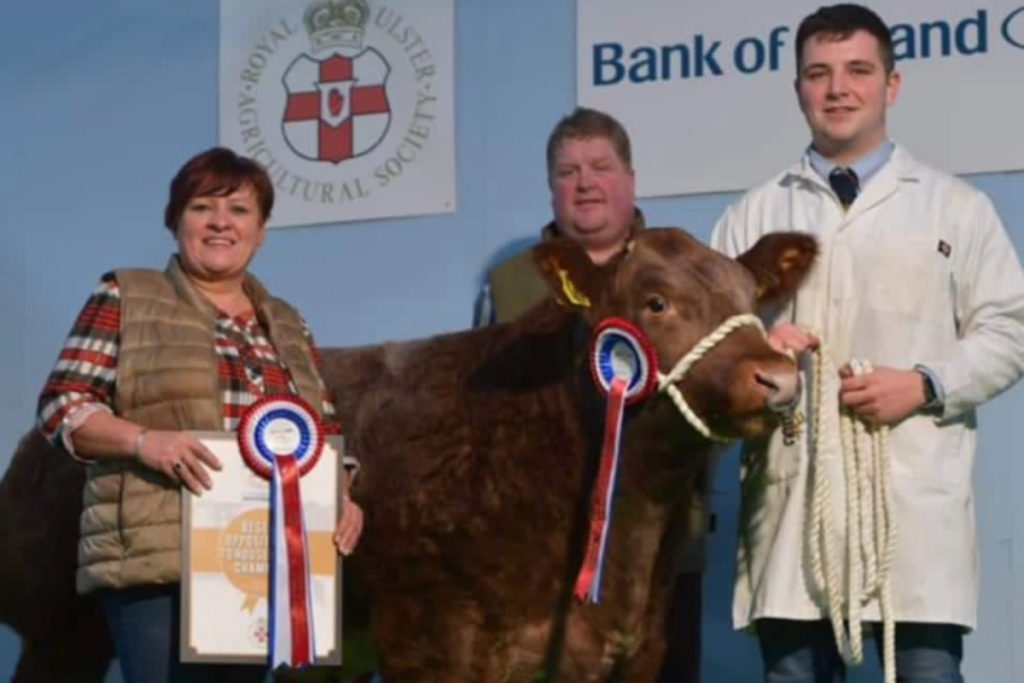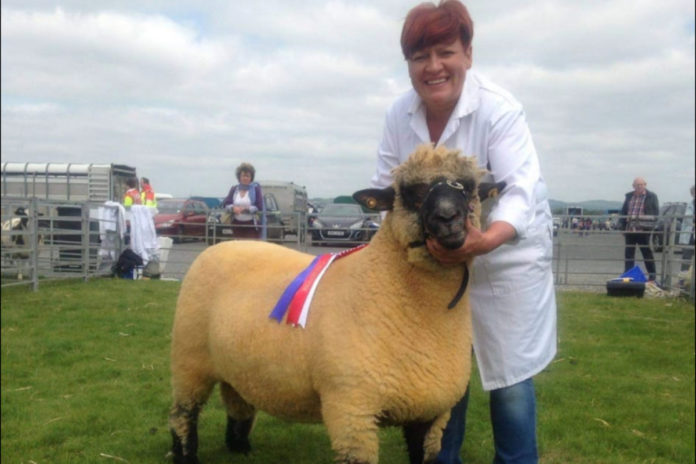In this week’s Women in Ag series, That’s Farming, speaks to Lynda Hamilton, a Tyrone-based, sheep farmer. Lynda gives her perspective of the ideal traits of a rare breed sheep and producing lambs for an early, niche market.
Lynda Hamilton, a food engineering graduate, qualified from CAFRE in 1991 and was employed in retail and foodservice management.
With little or no intent to farm full-time, she found herself working solely on her home farm from 2017.
The Tyrone sheep farmer tells That’s Farming:
“When I was in my 40s, I decided to leave the safety net of a full-time job and pursue my farming career. I started with a flock of pedigree Texels and just loved the preparation for showing.”
Lynda has powered into producing rare breed sheep across both Ireland and Northern Ireland in recent years.
Tyrone sheep farmer
The third-generation farmer and only child has always been involved in farming from a young age.
Hamilton, alongside her partner Bobby, farm a flock of pedigree sheep, as well as some commercial cattle in Omagh, Co. Tyrone.
The star couple also features on BBC’s popular TV series, There’s No Place like Tyrone.
The current flock comprises 100 pedigree, quality ewes and ewe lambs. Breeds include Dutch Spotted, Dorpers, Blue Leicesters, Zwartbles, and 10 Anglo-Nubian goats.
Hamilton explains the reasoning behind her selection of such rare breeds in Northern Ireland.
“Zwartbles are good milkers and mothers. Dorpers are a South African breed; the lambs grow quickly and easily lambed. On the other hand, the Dutch Spotted are an ideal butchers’ lamb with colour.”

A recent introduction to the flock involves a cross with Blue Leicester.
This is a new introduction of bloodlines into the rare-breed flock. The purpose of trialling this cross is to produce a catchy breeders’ ewe lamb with a unique appearance.
“I aim to produce a lamb that with size, milk and longevity. In a breeding ewe, the ideal traits I look for include a good carcass, short wool, tight skin, and an overall good model.”
“Conformation is the most important aspect; then I look at colours. Ideally, I aim for 50% white and 50% black.”
Now a full-time farmer, Lynda always expressed an interest in rare breeds.
In 2019, she had a complete sale of her flock of Texels and Oxfords Downs. Despite her success with these breeds, her dream was to “have a shed full of colour”.
After selling her Texels and Oxford Downs, she turned to the rare breed market and has not looked back since.

Improving farm infrastructure for early lambing and targets
“Our ewes are sponged to synchronise lambing, which begins in January. The reason behind our early lambing date is because we aim to produce a stronger lamb for earlier shows.”
Lynda produces lambs to show in Balmoral in May and prepares lambs for sales in July. Lambing early allows Lynda to provide lambs for this niche market.
In terms of retaining replacements, she explains how she keeps 5% of her best ewe lambs.
Ewes are lambed from ewe lambs to hoggets, all of which are tipped through natural service. The flock of rams include two Dutch Spotted rams, one Dorper and one Zwartbles.
In Northern Ireland, a grading system is in place for breeding ewes, which is ranked from grade 1 to grade 4. Lynda is currently focusing on producing her own Dutch Spotted lambs to improve grading overall within the flock.
“Performance of the flock is key. I set the farm with targets, either financial or performance-based.”
“We hope to achieve 1.5/1.8 lambs per ewe across the board. The culling strategy for the flock is simple: I remove ewes with prolapses or recurring feet problems.”
Furthermore, Lynda discusses how investing in farm infrastructure, has had a positive influence on her daily work-life.
In recent years, she developed arthritis and bone degeneration. For 2021, her goal was to construct a new 3-bay lambing shed. The purpose of this was to make tasks around the farm easier as her health deteriorated.
Next year, she aims to introduce more farm handling facilities to further improve available infrastructure.

Shows and sales
Lynda explains that all progeny she produces on her farm is sold directly from the farm or a sale. The rare-breed producer does not enter the factory market.
“Everything we sell directly off-farm is to breeders. Ewe lambs, which I purchase for breeding, are from 50kg upwards.”
Since her introduction to rare breeds, Lynda has had much success inside the show ring. Hamilton has claimed the title of Balmoral Show Rare Breed Champion.
Her pedigree Oxford Downs scooped the award for three years.
She has always enjoyed attending local marts and sales across Northern Ireland from a young age. The positive experiences have influenced Lynda to host her own selection of sales for her particular sheep market niche.
The successful breeder has just organised a third sale for coloured, rare and minority breeds of sheep and goats. The sale will take place at Richard Beatties in Omagh, Co. Tyrone, on Saturday, December 11th, 2021.
Lynda hosted another successful sale earlier this year included the first-ever inaugural Dorper sale in Ireland.
Aside from rare breeds, Bobby and Lynda are no strangers to the commercial cattle scene. The pair often attend shows and sales across the country.
When Lynda is not pampering her sheep, she is sure to be washing a calf on the end of a rope!

Managing a successful rare breed flock
Lynda’s long-term experience in managerial positions through retail and food service has translated over to her farming career. She explains how her farm is run exactly like any other business.
“I set targets for my farm. Also, I set a target price for each lamb this year, which I have achieved already. Furthermore, I keep control of all costs. As a full-time farmer without the safety net of another job, the farm has to make money.”
“Every day is different; you can’t plan for everything,” she added.
Furthermore, with the average trend for the market of rare breeds being strong this year, the future holds some uncertainties for breeders.
“Sheep have been a really good trade overall this year. It is not realistic for them to hold at these prices, especially with the prices of other inputs such as feed and fertiliser spiking.”
In the short term, Lynda does not have any desire to expand her flock.
“The plan for my selection of rare breeds is to continue to improve what we have. I’m focusing on grading up, improving the overall quality and genetics of the lambs produced,” the Tyrone sheep farmer concluded.
By Alicia Temple
To share your story like this Tyrone sheep farmer, email – [email protected]
See more women in ag profiles.





